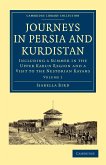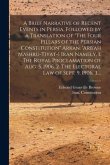Fred Reed went to Iran driven by discontent with the official Western view of that country as a den of fundamentalist fanatics and terrorists. Not surprisingly, he found that the Iranians had reasons - excellent reasons - for acting as they did. The Iran-Iraq war, cynically prolonged by the Western powers who armed Saddam Hussein against Khomeini's poorly armed but highly motivated revolutionary guards and volunteers, furnished the most conclusive example. Iranian history, in its meeting with the peculiar traditions of Shi'ite Islam, provided a wealth of others. In Persian Postcards, Iranians of many persuasions speak on the issues of their society, on regional politics, on the role of religion in life, on public and private morality. We meet artists and filmmakers, philosophers and mollahs, establishment men and dissidents, women speaking on women's issues and on life, members of parliament and "terrorists". Persian Postcards is more than a journalistic report, an academic treatise, or a travel book, although it enfolds elements of all three. It explores an unknown quarter, a territory inhabited by people of culture, dignity and poetic genius, moved by force which defy the impoverished classification theology of Reason and Technique. Persian Postcards is not only about Iran. It is about us.
Bitte wählen Sie Ihr Anliegen aus.
Rechnungen
Retourenschein anfordern
Bestellstatus
Storno







